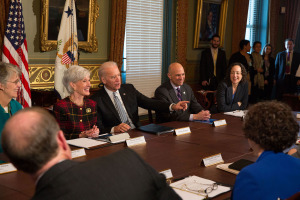
Colleges and universities are safer than the cities and towns that they’re in. But that doesn’t mean that there aren’t responsibilities to try to make them even safer. SUNY takes this seriously, and its campuses have been taking steps to increase student safety, whether in the residence hall, class, on campus, or anywhere else. We’ve all read the statistic that one in five women is sexually assaulted while at college, and men, although fewer, are also regular victims. SUNY and Governor Andrew Cuomo are trying to change that fact with the implementation of a new approach to how SUNY campuses prevent and handle sexual violence cases.

Recently, Governor Cuomo attended a SUNY Board of Trustees meeting where a statewide, uniform policy to combat sexual assault on New York college campuses was announced. “This is not just a SUNY problem, but SUNY can lead and SUNY can reform on-campus safety so we can better protect our students,” said Governor Cuomo last Thursday, when he first announced this effort. It calls for uniformity among the campuses in a number of areas, including a System-wide definition for consent and published amnesty policies for students reporting crimes, meaning that victims and bystanders reporting crimes won’t be charged with a drug or alcohol violation.
Amnesty policies are important because sexual assaults on campus often go unreported, for various reasons, but victims should always feel that they have options for getting justice and help from their administrators. At SUNY, it is always and will continue to be a victim’s choice to report to law enforcement, and also the victim’s choice whether or not to report to the college internal student conduct office. Part of the uniform policy changes will see all SUNY campuses adopting a Sexual Assault Bill of Rights outlining available remedies and resources. While our campuses have been educating students about this for many years, the uniform policy will allow students to know their rights no matter which SUNY campus they attend or visit.
An approach to action
The new approach includes a statewide public awareness campaign to help increase awareness among college and high school students. SUNY has already made strides in combating sexual violence on campus, even before Thursday’s announcement. This past spring, Chancellor Zimpher organized briefings about sexual violence prevention for presidents and provosts, as well as a briefing for the Board of Trustees. Unique among university systems, SUNY takes a System-wide approach to training and education for our professionals in taking steps to prevent crimes and respond appropriately to victims. Notably, a guidance document from SUNY about implementing the Violence Against Women Act is not only used by SUNY professionals, but available to colleges and universities across the country.

And more recent efforts have taken place as well. SUNY Senior Vice Chancellor for Executive Leadership Development & General Counsel Bill Howard visited the White House in April to work with Vice President Joseph Biden and Cabinet members as they gathered information for a Report of the White House Task Force to protect Students from Sexual Assault.
In September students at SUNY Potsdam came together to organize a day on campus to build awareness for sexual assault, where they decorated the campus in teal which is the official color of Sexual Assault Awareness Month. They also encouraged the campus to wear the color in solidarity. The University at Albany recently opened its Advocacy Center for Sexual Violence on campus, which aims to provide a safe place for students to receive support and advocacy services in the aftermath of sexual violence. SUNY Oswego’s Lifestyles Center promotes open communication about consent in an effort to prevent sexual assault and promote healthy relationships. New Paltz’s Title IX page is a one-stop shop for students interested in learning about policies, reporting, available remedies, and on- and off-campus student resources. A dozen campuses already had published amnesty policies, and many already have an affirmative consent definition in the campus codes. Now, all 64 campuses will have uniform policies on amnesty and consent.
These uniform policies join other longstanding uniform policies at SUNY aimed at protecting students, including the mandatory transcript notation policy. Students asked to leave the campus, or who leave the campus pending discipline for a crime of violence, receive a mandatory notation on their transcript. If that student tries to transfer with that transcript or use it for a job interview, anyone reading it would know the circumstances in which they left that SUNY campus. SUNY Cortland was recently referenced in an article discussing transcript notations, noting that they are a best practice as most colleges and universities do not use these notations yet.
With the implementation of these uniform policies, Governor Cuomo and SUNY will make New York the leader in combating sexual assault on college campuses, increasing safety standards for all students.



